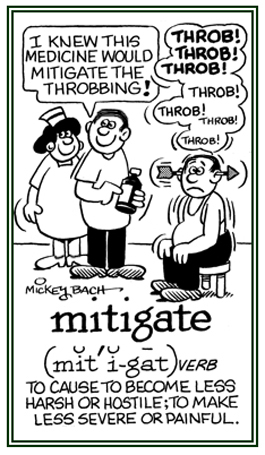litigiously
(adverb), more litigiously, most litigiously
A reference to how a person has the tendency to sue someone in court; excessively ready to go to court: Mr. Timmons
litigiously demanded evidence in the case presented in the law court.
Mrs. Lawson was litigiously inclined to dispute or to disagree, even to quickly engage in law suits instead of trying to negotiate an agreement.
litigiousness
(s) (noun) (no pl)
The act of disputing or disagreeing with others, especially through civil law suits: Mrs. Thomas's litigiousness certainly was part of her disposition because she had a strong impulse to engage in lawsuits.
mitigate
(verb), mitigates; mitigated; mitigating
1. To make something less severe, less harsh; easier to bear: The painkiller that Jack took to
mitigate or to relieve the soreness of his recent operation was to be taken before going to bed at night.
2. To lessen or to try to lessen the seriousness or extent of something: The science teacher, Mr. Tree, gave the students the assignment to write down ways or means that might
mitigate the global warming that was becoming quite serious with time.
3. To decrease in force or intensity: Wrath, grief, harshness, or pain can be
mitigated to become moderate again.
4. To make a situation or condition milder or more gentle; to mollify; to appease: to alleviate: The town tried to
mitigate poverty by providing free meals at the town hall.
 © ALL rights are reserved.
© ALL rights are reserved.
 © ALL rights are reserved.
© ALL rights are reserved.
 © ALL rights are reserved.
© ALL rights are reserved.
Go to this Word A Day Revisited Index
so you can see more of Mickey Bach's cartoons.
mitigation
(s) (noun), mitigations
(pl)
The method or result of effecting something to be less threatening, painful, cruel, detrimental, or serious: Dr. Thompson's main concern was the
mitigation of his wife's suffering.
Jim came home late one evening and in mitigation told his mother that he had helped a neighbor who wanted to cross the busy road to get home.
In the year of the terrible floods, the government offered mitigation to those who had suffered by losing their homes.
Mitigation can include avoiding the impact by not taking a certain action, minimizing consequences by limiting the degree or magnitude of the action, rectifying the impact by repairing or restoring the affected environment, reducing the impact by protective steps required with the action, and compensating for the impact by replacing or providing substitute resources.
mitigative
(adjective), more mitigative, most mitigative
Regarding the moderation of pain or sorrow by making it easier to bear: Mitigative efforts involve a desire to alleviate, render mild, or to calm a grieving person.
mitigatory
(adjective), more mitigatory, most mitigatory
A reference to the moderation of pain or sorrow by making it easier to endure; alleviative: Mitigatory attempts relate to anything which can lessen the intensity of something that is painful or distressful.
navigate
(verb), navigates; navigated; navigating
1. To plan, to record, and to control the course and position of a ship or an aircraft: The pilot and copilot navigated the plane from Frankfurt to Toronto.
2. To give directions to the driver of a vehicle: Jim used his cell phone with a google map to navigate his wife to their destination.
3. To voyage over water in a boat, or a ship; to sail: The children were able to navigate their raft down the slow river to the pier.
navigation
(s) (noun), navigations
(pl)
1. Travel or traffic by ship, particularly commercial shipping: There is a lot of navigation in and out of Bremerhaven or Hamburg to different foreign countries.
2. The charting of a course for a road vehicle, an aircraft, vessel, or spacecraft: There is a lot of theory, practice, and technology involved in the night navigation of yachts or other sea-going boats.
navigator
(s) (noun), navigators
(pl)
1. An individual who directs the course of travel: An officer on a ship is the navigator with the responsibility of getting the ship safely to its destination and on time!
2. An apparatus or device that directs the course of an aircraft or a car, truck, etc.: The navigator or instrument on the dashboard in Jim's car showed him which turns to take when driving to his destination.
3. In past times, an individual who explored by ship: Columbus was a navigator who traveled over the ocean in attempts of reaching land at some point.
objurgate
(verb), objurgates; objurgated; objurgating
1. To severely rebuke, to scold, or to censure: Luke’s mother
objurgated, or chastised, him harshly when she found out that he had taken money from her purse without her permission!
2. To express strong disapproval of something that has been done or of the one who has done it: Mrs. Smith was vehemently
objurgating the racism that existed in the school where she taught.
 © ALL rights are reserved.
© ALL rights are reserved.
 © ALL rights are reserved.
© ALL rights are reserved.
 © ALL rights are reserved.
© ALL rights are reserved.
 © ALL rights are reserved.
© ALL rights are reserved.
Go to this Word A Day Revisited Index
so you can see more of Mickey Bach's cartoons.
objurgation
(s) (noun), objurgations
(pl)
A harsh criticism or rebuke: Mary got a severe scolding or objurgation from her parents because she didn't call to tell them that she would be very late in returning home that evening.
objurgatory
(adjective), more objurgatory, most objurgatory
Descriptive of a strong scolding; reproving: Tim received an objurgatory remark from his girlfriend when he had no excuse for not meeting her at the train station although he said he would.
omniactive
(noun), more omniactive, most omniactive
Referring to a person who is involved with or doing things all the time: Because Lois was so omniactive, she was hardly ever at home due to her being so engaged and occupied in helping the poverty-stricken or destitute people in her town.
orrhoreaction
(s) (noun), orrhoreactions
(pl)
An in vitro test result indicating the presence, in serum, of immunologically active material: The outcome of a orrhoreaction is usually an antibody, but may be sometimes an antigen.
photoactive
(adjective), more photoactive, most photoactive
Concerning a chemical reaction to sunlight or ultraviolet radiation: Photoactive substances are capable of reacting to light or another type of electromagnetic radiation.









